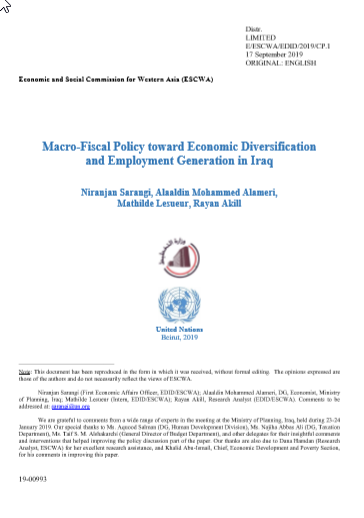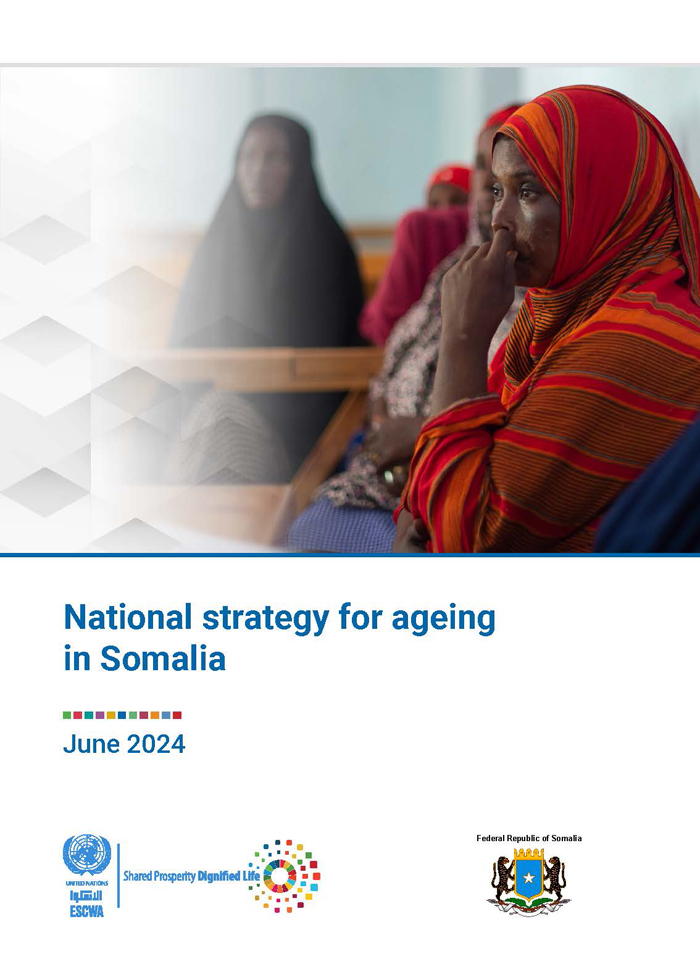
ESCWA Publication: E/ESCWA/EDID/2019/CP.1
Country: Republic of Iraq
Publication Type: Working papers
Cluster: Shared Economic Prosperity
Focus Area: Financing for development, Inclusive development
Initiatives: Financial & macroeconomic statistics for National accounts
SDGs: Goal 1: No Poverty
Keywords: Education, Fiscal policy, Iraq, Poverty
Macro-Fiscal Policy toward Economic Diversification and Employment Generation in Iraq
January 2019
The paper analyses macro-fiscal and structural challenges in Iraq and discusses fiscal policy options that can boost employment opportunities and foster economic diversification, in line with the National Development Plan 2018-2022 targets and objectives.
Our analysis suggests that high unemployment rate of the youth, narrowed employment opportunity of the higher educated youth, weak private sector, low productivity of non-oil sectors and low education levels of a large share of unemployed people are some of the significant challenges of Iraq. On the demand side, public sector used to absorb the higher educated youth, which is no longer an option for many due to the pressing fiscal space concerns. Private sector capacity is low to provide enough decent opportunities and to attract higher educated people. As a result, unemployment rate among the higher educated youth increased. On the supply side, the analysis of education levels of all unemployed reveals that more than two-third of them have not completed secondary level of education. About one third of them have not completed primary level education. The situation would have worsened in recent years due to adverse effect of conflicts.
The role of fiscal policy is crucial to create conditions to addresses the mis-match in labour demand and supply in case of Iraqi economy. In the immediate period, increasing access to finance to small and medium entrepreneurs and agriculture, encouraging hiring for the private sector through wage subsidies, and strategizing public works programme for reconstruction can produce immediate livelihood opportunities, including for the higher educated youth. On the supply side, spending on skill development programmes, providing entrepreneurial and managerial skills, and investing in quality education and research are crucial for improving the quality of labour supply. Well-designed macro-fiscal frameworks are needed for meeting short and medium term policy objectives, including to incentivize economic diversification and to enhance fiscal space in a more sustainable manner. Time is now to assess different policy options and evidence-based analytical tools for making appropriate choices.
Related content
Financing for development
, Inclusive development
,
The paper analyses macro-fiscal and structural challenges in Iraq and discusses fiscal policy options that can boost employment opportunities and foster economic diversification, in line with the National Development Plan 2018-2022 targets and objectives.
Our analysis suggests that high unemployment rate of the youth, narrowed employment opportunity of the higher educated youth, weak private sector, low productivity of non-oil sectors and low education levels of a large share of unemployed people are some of the significant challenges of Iraq. On the demand side, public sector used to absorb the higher educated youth, which is no longer an option for many due to the pressing fiscal space concerns. Private sector capacity is low to provide enough decent opportunities and to attract higher educated people. As a result, unemployment rate among the higher educated youth increased. On the supply side, the analysis of education levels of all unemployed reveals that more than two-third of them have not completed secondary level of education. About one third of them have not completed primary level education. The situation would have worsened in recent years due to adverse effect of conflicts.
The role of fiscal policy is crucial to create conditions to addresses the mis-match in labour demand and supply in case of Iraqi economy. In the immediate period, increasing access to finance to small and medium entrepreneurs and agriculture, encouraging hiring for the private sector through wage subsidies, and strategizing public works programme for reconstruction can produce immediate livelihood opportunities, including for the higher educated youth. On the supply side, spending on skill development programmes, providing entrepreneurial and managerial skills, and investing in quality education and research are crucial for improving the quality of labour supply. Well-designed macro-fiscal frameworks are needed for meeting short and medium term policy objectives, including to incentivize economic diversification and to enhance fiscal space in a more sustainable manner. Time is now to assess different policy options and evidence-based analytical tools for making appropriate choices.



